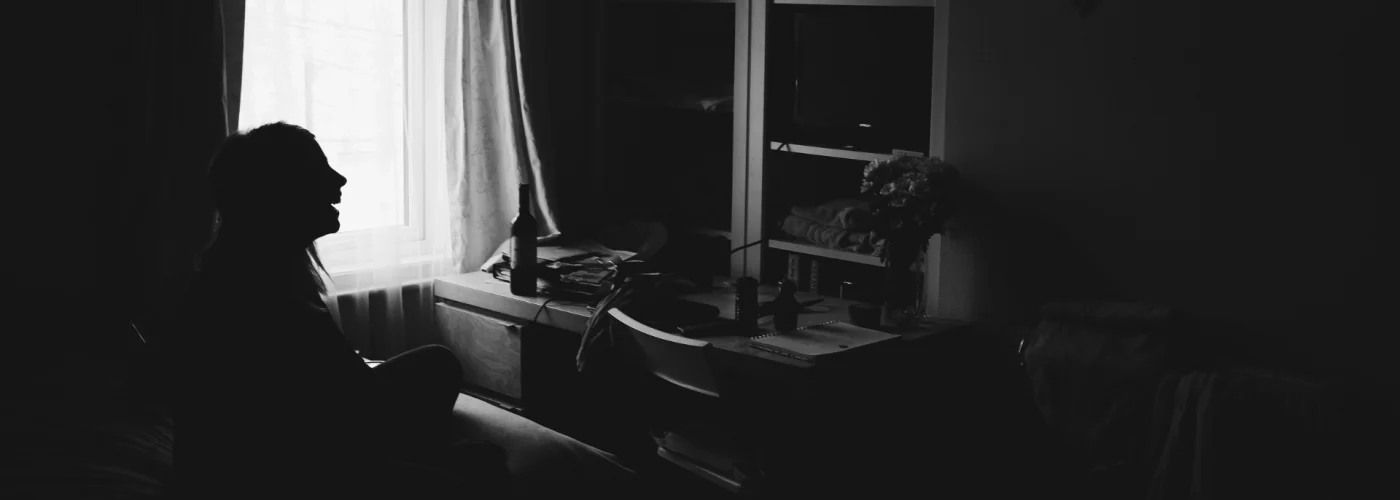It’s 3:17 in the morning. You’re wide awake. Not because you want to be.
Your sister has been struggling for a long time—therapy, medications, even short hospital stays. But every time she gets better, things fall apart again.
Now, you’re wondering if residential treatment for schizophrenia could be the answer. Since it’s Mental Health Awareness Month here in America, you think maybe it’s time to try everything possible.
Then your phone buzzes. It’s your sister. She’s whispering that the government is spying on her. She hasn’t eaten in days. And worst of all, she thinks you’re part of it.
You rush to her place, but the door is blocked. She’s scared (of you).
You sit in your car, tears falling, remembering the sister who used to paint sunsets and sing off-key.
You’ve tried everything. Nothing lasts.
So, let’s talk about it—does residential treatment for schizophrenia work?
Why Outpatient Care Often Falls Short
Is outpatient care enough for schizophrenia?
Not always. Often—no.
Mohammed et al. (2024) studied why people stop taking schizophrenia meds. They looked at patients in two big public hospitals.
The results?
- Nearly 45% stopped taking meds.
- They were more likely to quit if:
- They didn’t understand their illness
- They used drugs like khat (a leafy stimulant)
- They drank alcohol
- They were single
That’s a lot to manage alone.
Outpatient care means quick visits, maybe once a week. But schizophrenia doesn’t wait politely. It crashes in.
That’s where residential treatment for schizophrenia steps in. It offers daily care, real support, and structure—the kind outpatient can’t always give.
So, What Is Residential Treatment?
Think of healing yourself in a place that’s safe, calm, and always staffed.
That’s what residential mental health treatment looks like.
Veltro et al. (2024) studied 63 people with psychosis (mostly schizophrenia) living in nine residential centers in Italy.
What happened after six months?
- People socialized better.
- Their symptoms dropped.
- They handled stress more easily.
- They felt more in control.
Not bad, right?
They didn’t just get pills. They got:
- 24/7 support
- Daily therapy
- Life skills training
- Peer support
Residential treatment for schizophrenia works because it’s not just medical. It’s human.
The Brain Loves Structure
What the Research Shows
Residential treatment gives the brain a break—and a boost.
Giuliani et al. (2024) tried something cool. They ran a program called the modified Social Cognition Individualized Activity Lab (mSoCIAL). It was all about social skills, like reading emotions and reacting appropriately in social settings.
After 10 sessions?
- People got better at socializing.
- They had fewer struggles than those getting normal care.
That’s because residential treatment for schizophrenia isn’t just therapy. It’s practice for real life.
People cook, clean, talk, and reconnect. And that matters (a lot).
How to Choose the Right Facility
Not all places are equal. Some offer fancy websites and bad care. Others truly help.
Here’s what to look for:
- Licensed & Accredited – No license? No thanks.
- Expert Staff – Trained in psychosis. No generalists.
- Real Therapy – CBT. ACT. Evidence-based stuff.
- Custom Plans – Your loved one isn’t “typical.” Their care shouldn’t be either.
- Family Involvement – You matter, too.
A strong residential treatment for schizophrenia program helps both the patient and the family. You’re not just dropping them off—you’re part of the team.
Schizophrenia Isn’t Short-Term
Schizophrenia doesn’t simply go away. Even when stabilized, it lingers. That’s why the best residential treatment (see clinical trials at the University of California Health) includes aftercare plans:
- Ongoing schizophrenia therapy
- Support groups.
- Medication management
- Life planning
Think of it as a long road with many rest stops. You don’t just need a hospital bed. You need a full map.
Inpatient vs. Residential Treatment: What’s the Difference?
Let’s break it down.
- 🏥 Inpatient Treatment: For crisis mode. It’s short. Think of the emergency room, not home.
- 🏠 Residential Treatment: For long-term healing. Structure, therapy, community.
In 2025, McCutcheon and a global team of experts released something big—the INTEGRATE guidelines. These weren’t average dusty manuals. They built a smart, step-by-step treatment roadmap for schizophrenia based on real evidence and real experience worldwide.
Their advice? Care settings matter. Choose based on what your loved one needs right now.
Can You Treat Schizophrenia Without Medication?
Short answer? Meds matter. But they’re not the whole story.
Nibbio et al. (2024) said that antipsychotics don’t help much with thinking problems in schizophrenia—stuff like focus, memory, or decision-making.
So what helps?
- Cognitive training
- Exercise
- Brain tools like transcranial direct current stimulation (tDCS) and transcranial magnetic stimulation (TMS) (still in testing)
- Good food for brain-gut health
Best plan? Use meds + therapy + lifestyle changes.
Residential treatment for schizophrenia brings all of these under one roof.
Therapies That Work:
- CBT: Rewires bad thoughts.
- ACT: Teaches people to handle scary thoughts without freaking out.
- Mindfulness: Keeps calm in chaos.
- Cognitive Remediation: Brain workouts for better thinking.
- Gut Health Focus: What you eat might affect how you feel.
The best programs use a mix. Residential care brings them all together—consistently.
Supporting Families
Your Role Matters
Schizophrenia doesn’t just mess with one person. It shakes the whole family.
But guess what? Families can help heal, too.
Need proof? Parvin et al. (2024) studied families who underwent Acceptance and Commitment Therapy (ACT).
Eight weeks. One session per week.
The result?
- Less stigma
- Stronger relationships
- Better coping
So, what can you do?
How You Can Help:
- Learn about the illness – Understanding beats guessing.
- Attend family therapy sessions – Don’t just cheer from the sidelines. Join the game.
- Encourage treatment – Be the nudge they need, not the pressure they fear.
- Be patient – Recovery zigs and zags. Keep showing up.
💡 Here’s a tip: residential treatment for schizophrenia programs involving families tend to succeed more.
Because healing is a team sport.
Spot the Signs Early
Before a full psychotic break, there are hints.
Ward and colleagues (2024) did something big. They scanned brains to see how early signs show up.
They found that people who later developed schizophrenia had different brain activity patterns even before symptoms exploded.
So what does that mean?
It means early detection works.
Common Early Symptoms:
- Pulling away from people
- Not bathing or cleaning
- Strange beliefs or “magic” thinking
- Emotionless face or voice
If you see these signs, don’t wait.
Early help = better future.
Residential treatment for schizophrenia is especially powerful when started early.
So… Does Residential Treatment for Schizophrenia Work?
Yes. Absolutely yes.
It gives people with schizophrenia the tools, support, and structure they need.
Is it magic? No.
Is it real hope? Yes.
And for many families, residential treatment for schizophrenia is the turning point.
At Alter Behavioral Health, we know what schizophrenia does to families. And we know how to help. Our programs offer care that’s kind, expert, and built for the long haul.
It’s time to stop doing this alone.
📞 Contact Alter Behavioral Health today. Let’s bring your loved one back.



